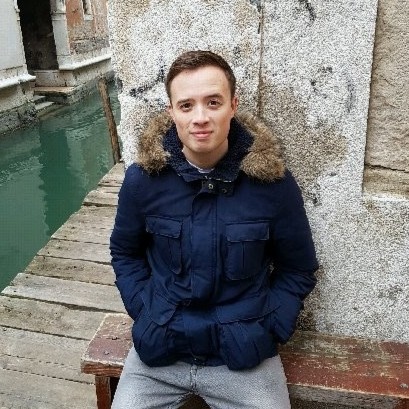How to win the World Cup, by the men who've done it
There’s no secret formula for winning the World Cup. But amid the chaos of variables, some patterns do emerge. FFT has quizzed the men who have been there, done that and got the medals, knighthoods and international superstardom to prove it...
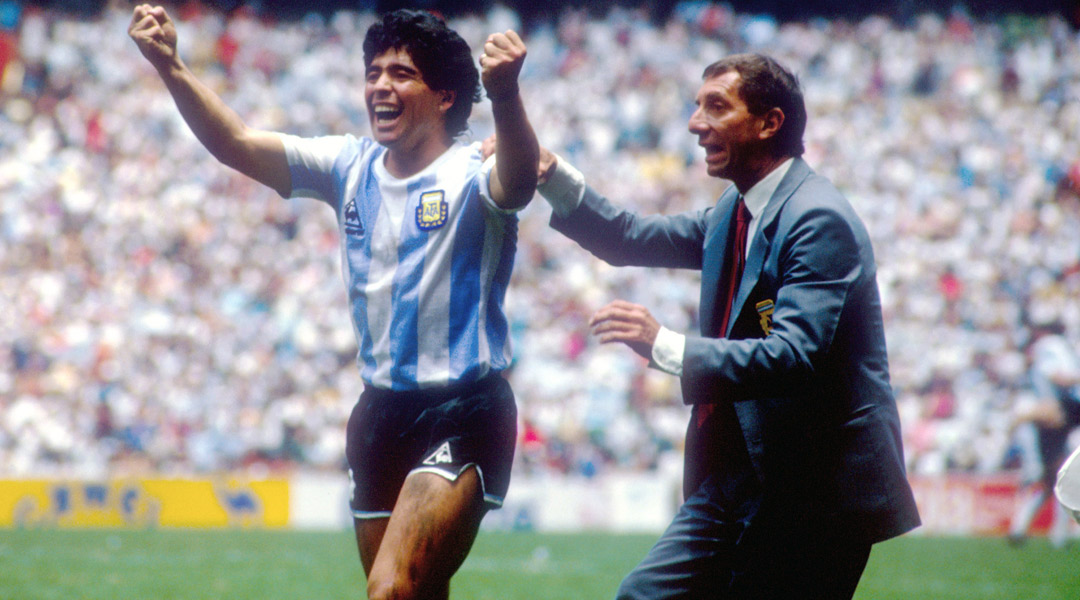
Every tournament is different, from the crowds and the climate to the rules and the balls. Sometimes the most famous trophy on earth is lifted by a glorious team of dazzling superstars: think Brazil in Mexico '70 or France on home soil in 1998. On other occasions, a plucky underdog has prevailed: witness Uruguay toppling Brazil at the Maracana in 1950, or the Miracle of Berne four years later as unfancied West Germany beat an all-star Hugary side through sheer willing.
Their answers may surprise you. Amid the talk of tactics, preparation and backroom staff, there are tales of secret fishing trips, ‘lucky’ vigils to pray in front of the Wailing Wall, the benefits of smoking, and a cautionary tale about not counting your chickens. We’ve spoken to the managers, the players, the dressing room joker and even the team chef...
They said...
Go fishing
“During a World Cup you have to relax. I don’t like fishing, but (reserve goalkeeper) Baley wanted to go. 'Wanna come?' he asked me after the Peru game. Sometimes the pressure is too much, so I said: 'why not.' Menotti authorised it, but asked us to be back for the training session at 10am. Baley woke me up in the middle of night, our kit ready. You can’t imagine how cold it was. In the morning, we returned with four fish and handed them to the cook. The rest of the lads, watching us eat fresh fish at lunch really envied us.”
Mario Kempes, Argentina 1978
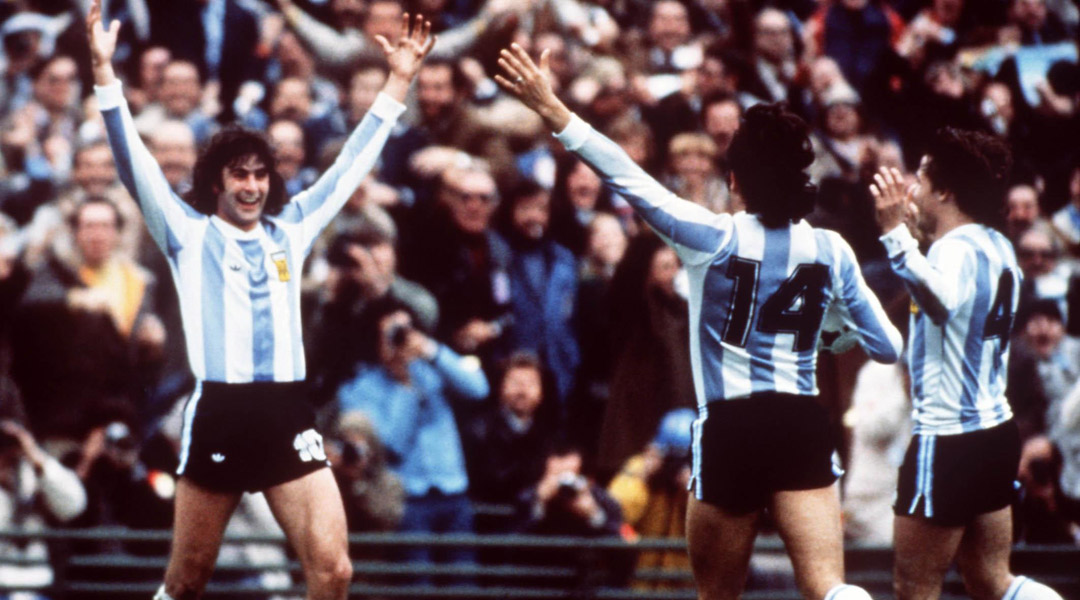
Pray for rain
“Fritz Walter [West Germany’s star player] was more or less ineffective on very hot days. He was playing at his best in a slight downpour. On the morning of the 1954 final German players went out onto the balcony of their hotel to check the weather. It started raining at around midday and that’s when Max Morlock said: ‘Now, nothing can go wrong’.”
Uli Hesse, author of Tor! The Story Of German Football
Have a joker in the pack
“After I got injured in the first game, the other players asked me to stay. I was one of the most experienced players in the squad. I knew I couldn’t let the injury knock me down because it would affect the squad. I’ve always been a joker in the dressing room. During that campaign, whenever I noticed there was tension in the air, I would try to crack a joke. I knew there was a limit. After the game, when we’d won, I’d start my gags again. One of them was to rate players badly even if they’d been great: ‘Romario, you were dreadful, I give you two. Bebeto, your score is three. If I’d played, I’d have been the man of the match.’ Then, I got better and was selected for the bench in the final. That was my reward. Being on the bench already made really happy.”
Ricardo Rocha, Brazil 1994
Prepare, prepare, prepare…
“The most important thing is to have a good team. Then you have to plan your training sessions, finalise your strategy and ensure that preparations take place in an ideal manner. You also have to have the players focused for the tournament and motivated to win the title, because they are the ones that enter the field and play. Last but not least, you can’t afford to make any mistakes. The World Cup is not a league, it’s a knockout tournament and if you have one bad night you can waste everything; lose one match and you’re travelling back home”
Carlos Parreira, 1994 Brazil manager
Get FourFourTwo Newsletter
The best features, fun and footballing quizzes, straight to your inbox every week.
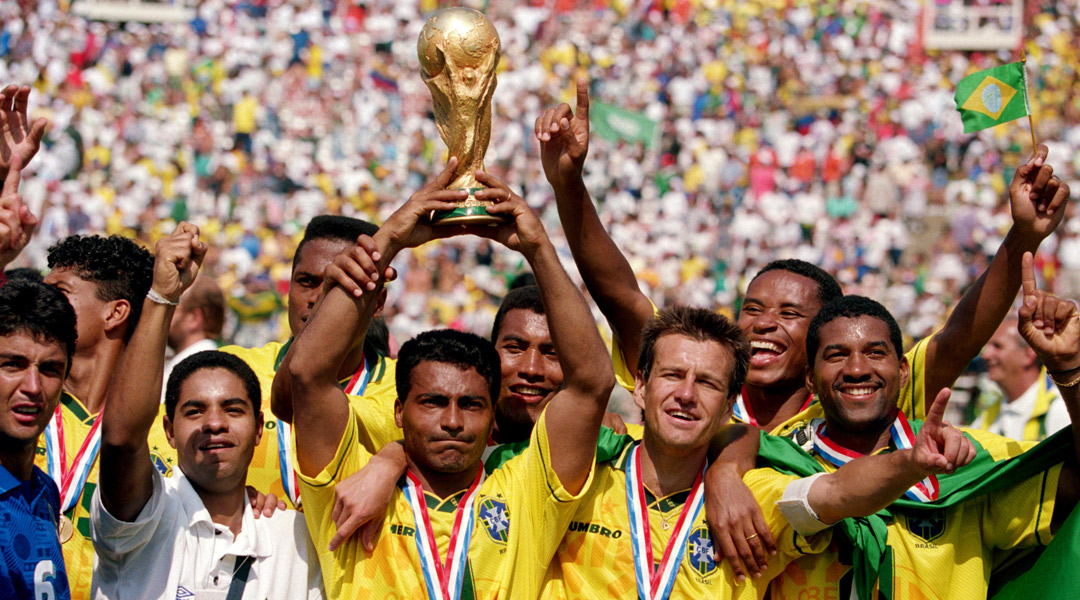
Be well fed
“When the team are at Coverciano [the Azzurri’s HQ] I always cook them a traditional bistecca alla Fiorentina, then prosciutto and parmigiano cheese. Generally though, it’s steamed vegetables, slices of prosciutto and bresaola, parmigiano, pasta with fresh tomatoes, grilled chicken or sole fillets.
“Before the World Cup final in 2006, I stuck to the classics: risotto alla parmigiana, cosce di pollo arrosto e branzino al rosmarino al forno, roast potatoes and e crostata. I work closely with the nutritionist and there are certain things they don’t like me using, like garlic and onion, very little butter and never cream.
I never cook red meat on the eve of a game, and even when it comes to the chicken you have to make sure that it’s really well-cooked to ensure that there’s not even a trace of blood.
Marcello Lippi wanted fish every day. Daniele De Rossi too; he goes mad for some fillet of sole. He also loves his chocolate biscuits. Rino Gattuso adored a hot spicy peperoncino, as well as being a bit partial to sweet ravioli made with chocolate. Fabio Cannavaro always asked me for an omelette before every game during the last World Cup. Francesco Totti hated uncooked meat because he doesn’t like the sight of blood. And the day after a game, everyone wants a pizza.”
Claudio Silvestri, official chef for the Italian national team
But not too well fed…
“The team is always formed and oiled off the pitch. Thinking otherwise is a mistake. We were on tour in Europe and it was nothing to do with a tour of professional and bourgeois players. We were football workers. Travelling from Kiev to Moscow, after a day-and-a-half without eating, we got a sausage and a loaf of bread. One slice each. From there we went to Warsaw, then travelled eight hours in a snowstorm in a bus to get to Czechoslovakia. And those were the best games, where our players ran the most. There was this inevitable hunger of glory. You could sense it.”
Cesar Menotti, Argentina 1978 coach
Balance the best players with the best team…
“To this day I’m not convinced of having brought together in Germany the technically best players that could have been. But I was firmly convinced I called the ones that could create a team, and they could play with one another. In this day and age you win if you become a team. It doesn’t necessarily mean that you’ve got the best players. It’s possible that the best, all together, don’t become a team. It’s like a mosaic – you have to put all the pieces together.
“You must not choose players who are a photocopy of each other. If you have variety in the selection, you may have to vary the system of play. Matches start in one way, they then evolve in a different way, and often they finish in a totally different way. Try to capture the moments when you see the possibility of winning the game.”
Marcello Lippi, Italy 2006 coach
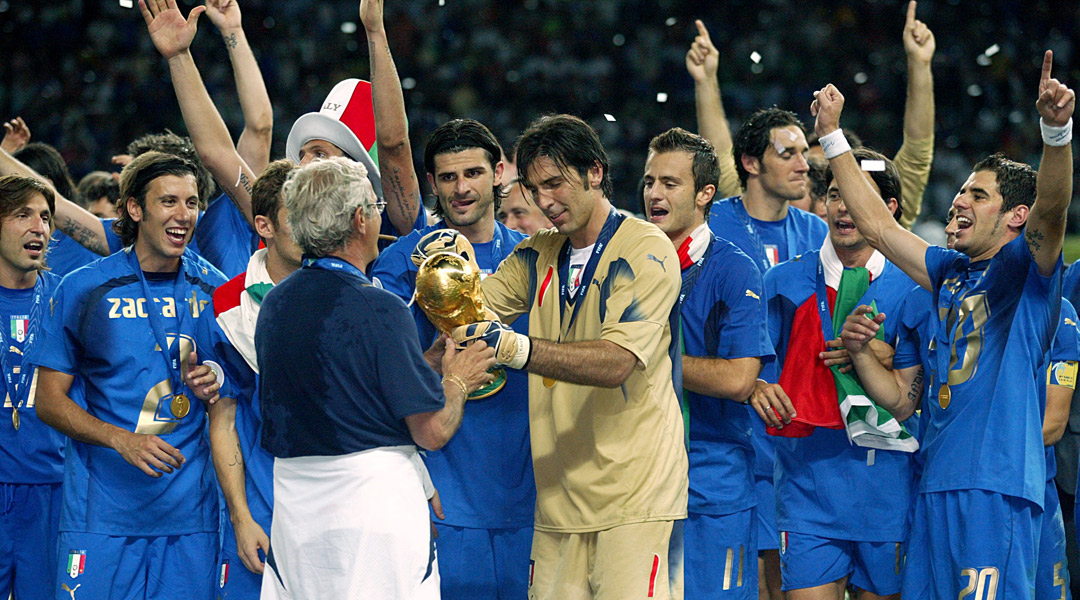
Don’t be a slave to a system
“It doesn’t make any difference. There’s no system that can win you the World Cup. You have to have desire and belief. Football nowadays has a lot of teams that are at the same level. And all of them play broadly the same system and style. What will make the difference besides talent is guts.”
Mario Zagallo, won with Brazil 1958 and 1962 as a player, 1970 as manager, 1994 as assistant
Be confident
“Going to the 1990 final, we drove like a pub team playing a friendly somewhere. Beckenbauer said: ‘you made it so far, it does not matter if we lose now.’ He told defender Guido Buchwald to look after Maradona and said: ‘Regarding running and fighting, you are better.’ One big secret about the World Cup campaign was the easy-going atmosphere we were in.”
Klaus Augenthaler from 1990 West Germany
But don’t be overconfident…
“The Dutch were behaving as if the had already won. The things they said before the game were the best motivation for us.”
Gerd Muller in 1974
“Before the (1974) final, I still recall them [Holland] playing Tulips From Amsterdam. And then I thought, ‘We’ll pluck those tulips alright’.”
Sepp Maier, 1974
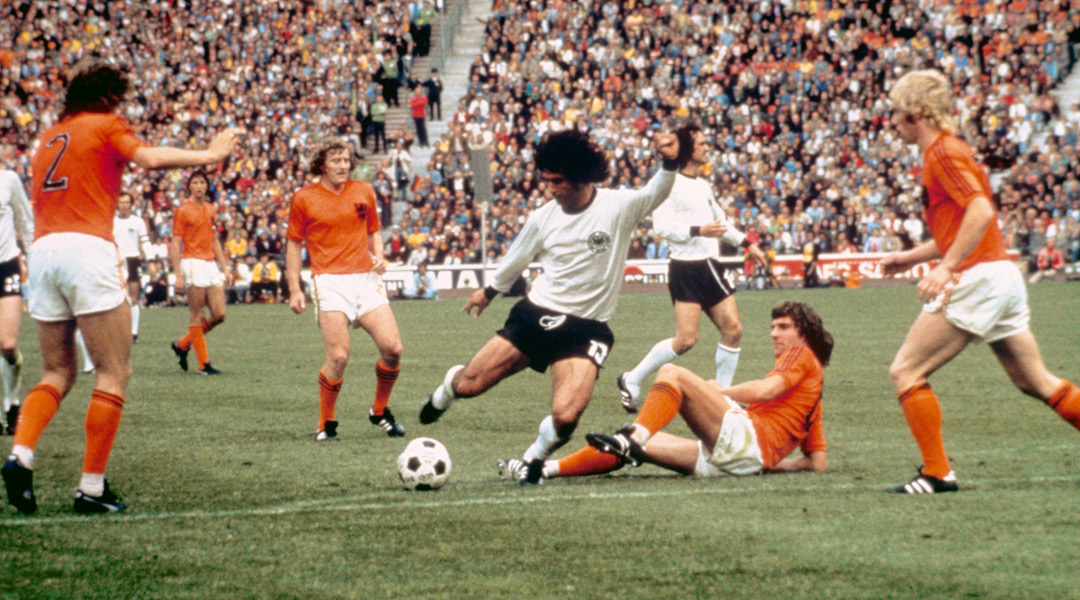
“I’m not a great one for stats but if you were to look at our results in the run-up to the World Cup it was a really special. We were going to places like Poland, Spain and Czechoslovakia – who had reached the final in 1962 – and beating them at their places. We were battle-hardened, experienced and upbeat. That was the perfect preparation. We were confident before the World Cup, but we didn’t enter the competition saying we were going to win it. No one can do that because it’s such a tough competition. Alf Ramsey said that we’d win but I didn’t think he was being that serious. He was trying to give us a lift.”
Gordon Banks, England 1966 goalkeeper
Have the tournament’s best player
“There are types of players that you have to have in your squad if you want to win the World Cup. You need players that inspire the others. These players are the ones who can offer different skills. All the champions had this: Gerd Muller, Pelé, Garrincha, Romario, Ronaldo, Maradona, Paolo Rossi. But you need to have a good team around this brilliant player to win - he won’t be able to win the World Cup single-handedly.”
Carlos Parreira, 1994 Brazil manager
Be patriotic
“Turning out for the national team is the ultimate achievement for a player, the ultimate recognition of his talents. You have to make sure your players understand that, you have to ensure that they draw confidence from it. Is that sort of pride in the national team dying out? I do hope not.”
Enzo Bearzot, Italy’s 1982-winning coach
Have a ‘Plan B’
“The key to winning a World Cup is to put in place a system that could change at any time. In my head, I had already considered the possibility of being able to play without Zinedine Zidane, without Laurent Blanc, without Marcel Desailly – to be able to tackle all the games. It's lucky I did that, because we had many misfortunes in the competition.”
Aime Jacquet, France manager in 1998
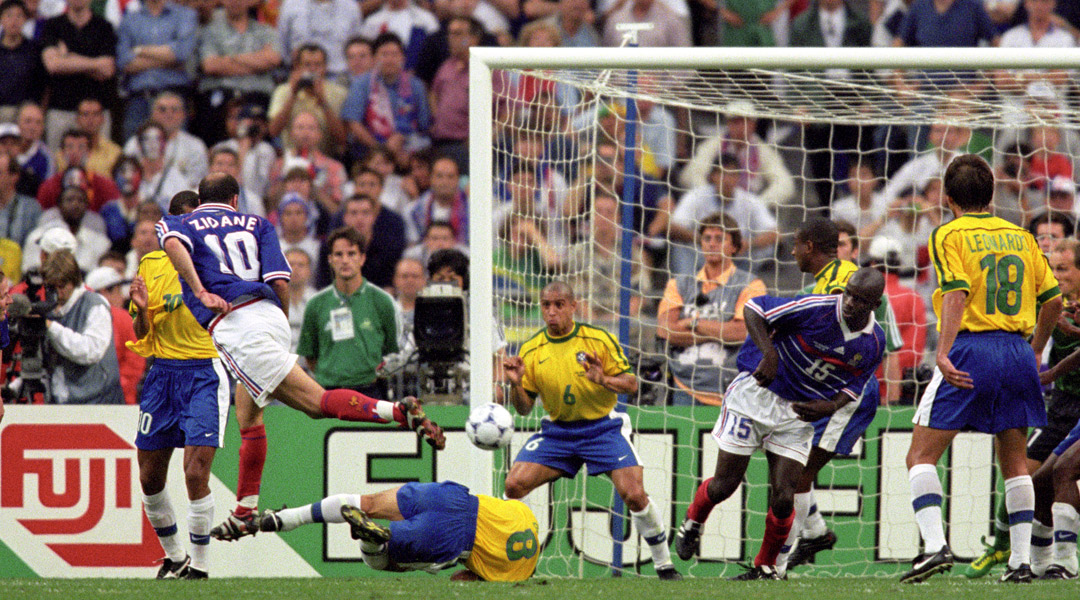
Silence the opposition fans
“Only three people have, with just one motion, silenced the Maracana: Frank Sinatara, Pope John Paul II and me.”
Alcides Ghiggia, the Uruguayan whose crucial goal clinched the 1950 final in Brazil
Lead yourself not into temptation
“When we arrived at the hotel in Sweden there were two women there, two beautiful women actually. But the head of the delegation asked the hotel if these girls could stop serving us. They were taken away the following day.”
Paolo Amaral, Brazil 1958
Believe that anything is possible
“A year before the World Cup, I got an injury with the national team and Espanyol didn’t want me. I spent the last months alone in Buenos Aires, training on the road. Was it hard? Definitely. Did I quit? Never. My desire to go to the World Cup kept me going. Once I was there, I wasn’t going to let myself be substituted. I suffered a dislocated shoulder in the final. I was in pain, so I played with my hand inside my shirt. Every time I approached the touchline, I’d see Bilardo with my number on the board, waiting for me to ask for substitution. Impossible. The only way I would have left the pitch is if I was dead.”
Jose Luis Brown, Argentina 1986
Stay entertained
“Psychologically, when you play such a big event as the World Cup, you think a lot between the games, and when you are left alone with yourself, you have to find something to do. It’s not necessarily bad stress, but it’s also the job of the staff to maintain a regular level of concentration, without building too much pressure. It’s a very subtle search of balance.”
Emmanuel Petit, France 1998
But not too entertained…
“If I have any advice for a manager, it’s to take his players as far away from bars as possible.”
Petit again
Stick to your guns
“We got criticism for our playing style, for the players I picked, some even criticised me for picking Maradona as captain. We were not placed in the list of potential winners. But we took advantage of that – we knew it was going to be excellent proving everybody wrong.
Carlos Bilardo, Argentina boss in 1986
Start from scratch
“I took over on October 1974, a week before an official game with Spain. It was just another example of the lack of organisation Argentina had. The national team was not a priority. A month before a World Cup, they’d call up a bunch of players that were doing well and make a tour. With that recipe, Argentina had never won anything.
“So I presented a plan, starting in 1975, to see if the FA was willing to change, to start from scratch. We divided the country in six zones and each had its own selection of players. Each team would represent Argentina in a number of competitions. There were critics saying that we were using too many players for nothing, yet from the World Cup-winning squad, 90 per cent arrived from those teams. Players such as Galvan, Villa or Ardiles came from there. And the likes of Gallego, Passarella or Tarantini were part of the team that won the Toulon tournament, the first trophy Argentina won in Europe. It was very important. We had hundred of files, compiled by people that worked for me or by people who knew about football. Sometimes it’s easier to ask the shoeshine boy from each town, if you notice that he has a good eye for football.”
Cesar Menotti, Argentina 1978 coach
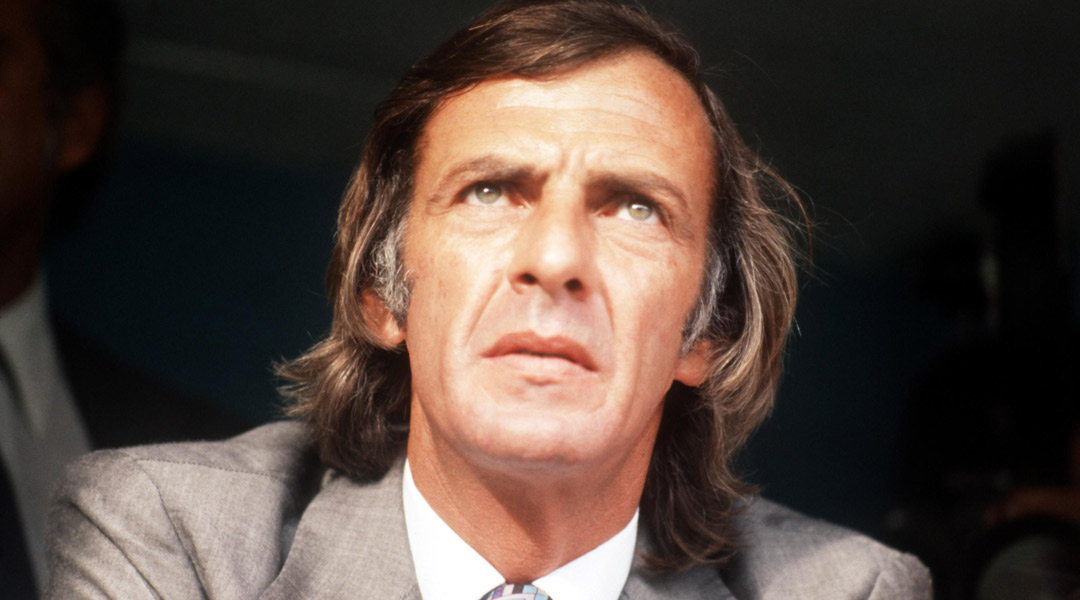
Instill belief
“I tried to give the Italian players the same conviction that I had within myself, which was the conviction that I believed strongly, 100 per cent, that in Italy we had the potential to make a World Cup-winning team. For me, what’s most important is that the group is like the family where there is cohesion and the will to cooperate.”
Marcello Lippi
Forget about the qualifiers
“We’d a suffered a lot in the qualifying round in order to get to the 1986 World Cup. We almost went out at home against Peru. An injury-time goal saved us. The press destroyed us. They even criticised Maradona. There was a campaign to have our manager sacked. But we were united as a group, and from that union, we knew we had the strength to overcome everything.”
Jose Luis Brown
Or try these...
Visit Israel
Perhaps not the best idea for Iran, but Argentina found their visit to Israel’s holy sites in 1986 so effective that they superstitiously repeated it before the following two World Cups. “It was an extremely sensitive experience before such a crucial tournament,” says Jorge Burruchaga, “it helped us reconnect with ourselves.”
La Albiceleste made the trip again in 1990 before heading to Italy. The ‘lucky friendly’ (which was won 2-1) worked wonders – they reached the final again, and the whole campaign was seen as a miracle. Prior to USA 1994, they were back in Tel Aviv again. Maradona, however, perhaps jinxed this trip by declaring “I hope God is an Argentine” in front of the Wailing Wall. Argentina were eliminated in the round of 16. They haven’t been back since.
Get your manager on the snouts
An unusual number of World Cup-winning gaffers love a tab. Cesar Menotti (Argentina, 1978) smoked cigarettes, Enzo Bearzot (Italy, 1982) was rarely seen without a pipe in his mouth and Marcello Lippi (Italy, 2006) enjoys a pitchside cigarillo. Smoking players fared less well: chain-tabber Johan Cruyff never lifted the trophy.
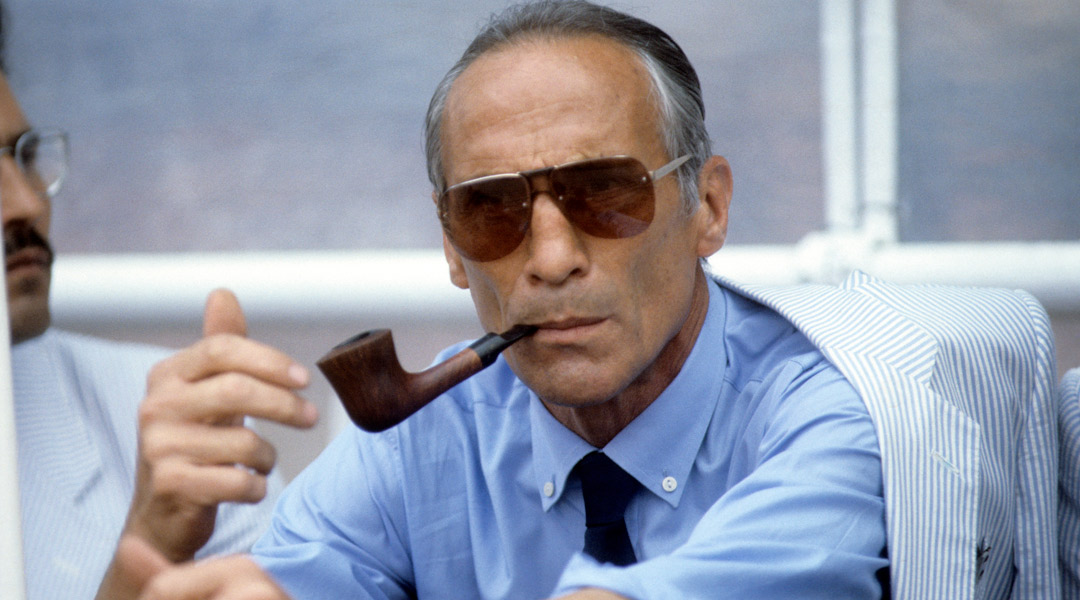
Employ football’s Nostradamus
Only it’s not even a person, but a piece of machinery – and its ability to predict injury could be the difference between winning and losing. The Omega Wave – although sounding like the latest thrill at Wet’n’Wild – effectively tells medical staff when a player is about to be injured or fall ill. Previously it’s been good enough for World Cup participants Spain, Portugal, Italy, Japan and the USA – as well as Manchester United, Real Madrid and Barcelona.
For such a futuristic concept, it’s surprisingly simple to work: take a portable computer, plug in some cables and sensors and – here’s the key bit – if you have Omega Wave software, the information churned out five minutes later will reveal when muscle, sinew, ligament or even a major organ like the heart or the brain is about to stop coping with the enormous demands on a top player. “Since we started using this technology, none of the players have come down with muscle injuries,” says Piet Hamberg, technical director of the Liverpool Academy. “We went and looked at our records for comparable times in previous seasons and this absence of injuries is unprecedented.”
And that’s not all. The Omega Wave can also read the body’s indicators for illness - the autonomic, cardiac, metabolic, hormonal and central nervous systems – to predict when a player is about to feel poorly.
“I came out to train feeling good and ready for a workout but before stepping on the pitch my coach told me to go easy today because my Omega Wave assessments didn’t look too good,” says Italy’s World Cup winning striker Luca Toni. “Since I didn’t feel any different to the day before I doubted the information. That night I came down with a fever and barely got any sleep. That’s how I learned to trust this technology.”
For even more interviews with these World Cup-winning legends, head over to FFT.com
Gordon Banks
(England’s ’66-winning keeper.)
Be good mates
“The main reason we were such a good team was because of the camaraderie between the players. There was no jealousy, no big egos, we just all got along really well and we took that spirit onto the pitch.”
Be in good form – but don’t be cocky
“I’m not a great one for stats but if you were to look at our results in the run-up to the World Cup it was a really special. We were going to places like Poland, Spain and Czechoslovakia – who had reached the final in 1962 – and beating them at their places. We were battle-hardened, experienced and upbeat. That was the perfect preparation. We were confident before the World Cup, but we didn’t enter the competition saying we were going to win it. No one can do that because it’s such a tough competition. Alf Ramsey said that we’d win but I didn’t think he was being that serious. He was trying to give us a lift.”
Respect the gaffer
“Alf Ramsey was very strict. Whatever he said, you had to do, whether it was on or off the pitch. If a player didn’t do what was asked of them, he’d leave them out. For that reason, the players listened to every word and took in what he said.”
Concentrate!
“For some international matches I spent long periods of time not doing anything. It could have been easy to switch off and lose concentration but the key to being a good international keeper is making sure you stay focused for 90 minutes. I had to make sure that when an opposition player popped up out of the blue I could react. Being a goalkeeper at a World Cup is a special kind of pressure because any mistake you make is played on TV around the world. If you make a mistake, put it to the back of your mind. If you let it fester it’ll affect your performance.”
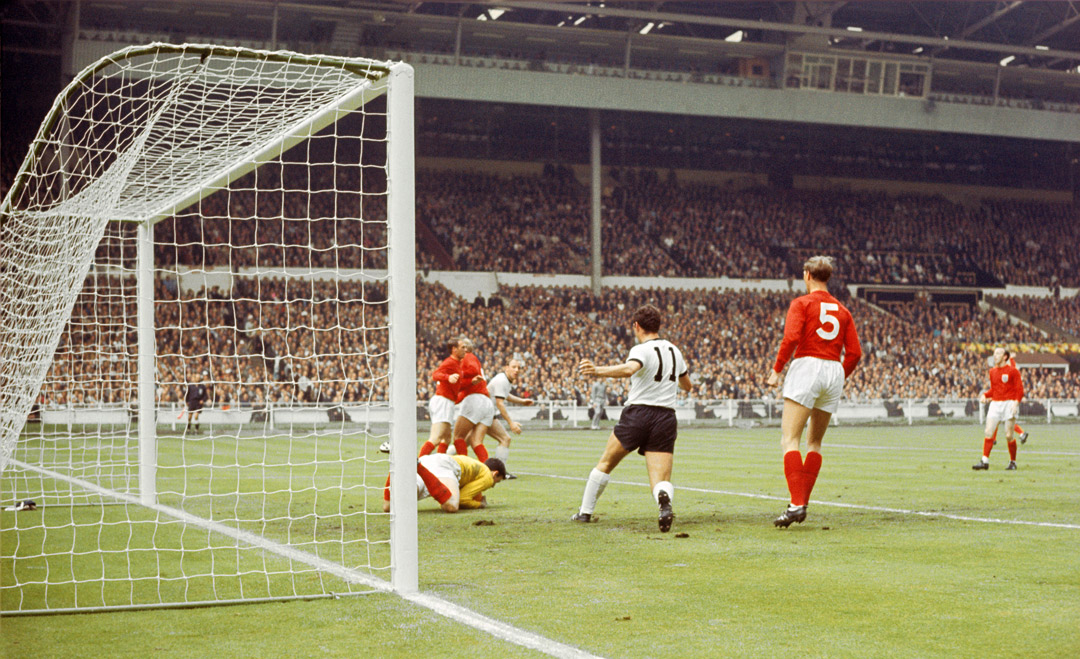
Mario Zagallo
(Won the World Cup with Brazil in 1958 and 1962 as a player, 1970 as manager, 1994 as assistant manager.)
Have the best set-up
“The secret is to have a great structure off the pitch: a top medical team, physiotherapists, physiologist, psychologist and all the other specialists who help you to build an amazing team. Of course, it’s also important to have an outstanding team – players who can win matches. But they have to be well-maintained; that’s very important.”
Don’t be a slave to a system
“It doesn’t make any difference. There’s no system that can win you the World Cup. You have to have desire and belief. Football nowadays has a lot of teams that are at the same level. And all of them play broadly the same system and style. What will make the difference besides talent is guts.”
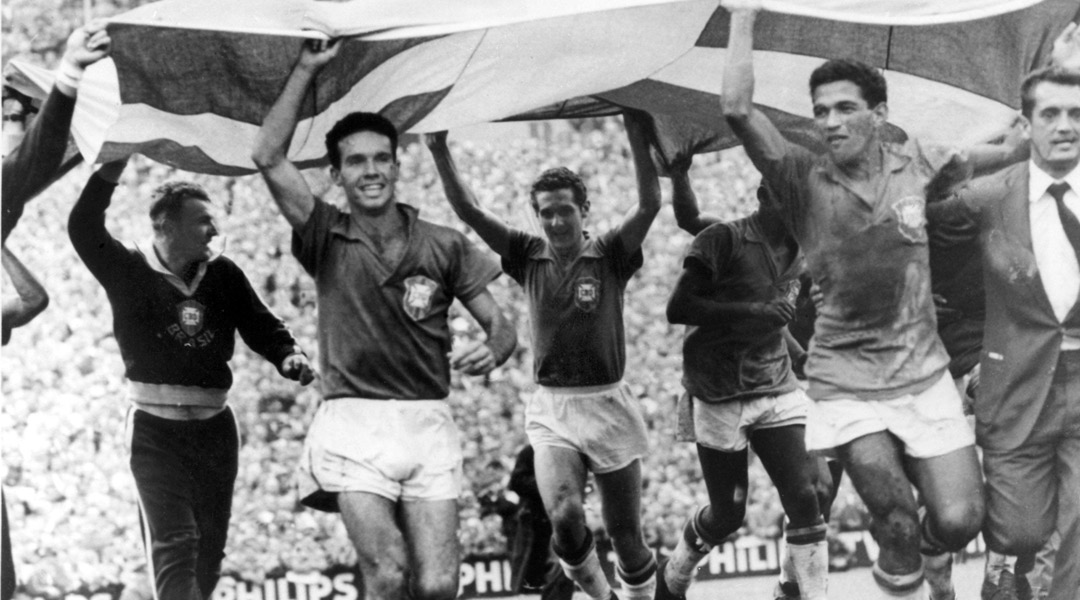
Luiz Felipe Scolari
(Brazil's trophy-lifting mastermind in 2002.)
Select your squad logically
“First I imagined a scheme of play, then a group who would play like I want. I say: OK, these are my players in total, but if one is unavailable? Before I selected my final 23 I thought of all the possible scenarios I would have to face in the World Cup. I used a lot of analysis of personal characteristics of each player. A player might be the best in the world, but without a good personality and the ability to develop he would be worthless.”
Pick brains over brawn
“Contrary to what people seemed to expect of me, I looked for the least physical players possible. I thought great individual players would decide the World Cup and Brazil has these. Football is more and more homogenous. Individual potential opens everything up if you dare. I believed the World Cup would be the ultimate test of that – individual qualities would decide matches. And that is what happened.”
Try to create a club atmosphere
“During one difficult preliminaries game, I remember being alone in the dressing room, thinking not only am I going to change the way I am, but also I’m going to work as if the national team was a club. That was my challenge: try to put in a national team the spirit of a club with its unity, confidence and friendship during the season. During the preliminaries I stayed in touch with every player and told everybody the same message: if we keep united we’ll make it. Friendship grew.”
Stress the human side, not the tactical
“Brazil is always obliged to win the World Cup, adding one thousand per cent more pressure. It is not easy for a player of humble origins to represent his country. This yellow and green shirt is sacred. It weighs heavily on him. Because of this, I decided to put the tactical aspects aside a bit in order to develop the human side. That put great stars and the less famous players on the same level, balancing a Ronaldo with a Klerberson. We came out strong. As friends. As a family. And as champions.”
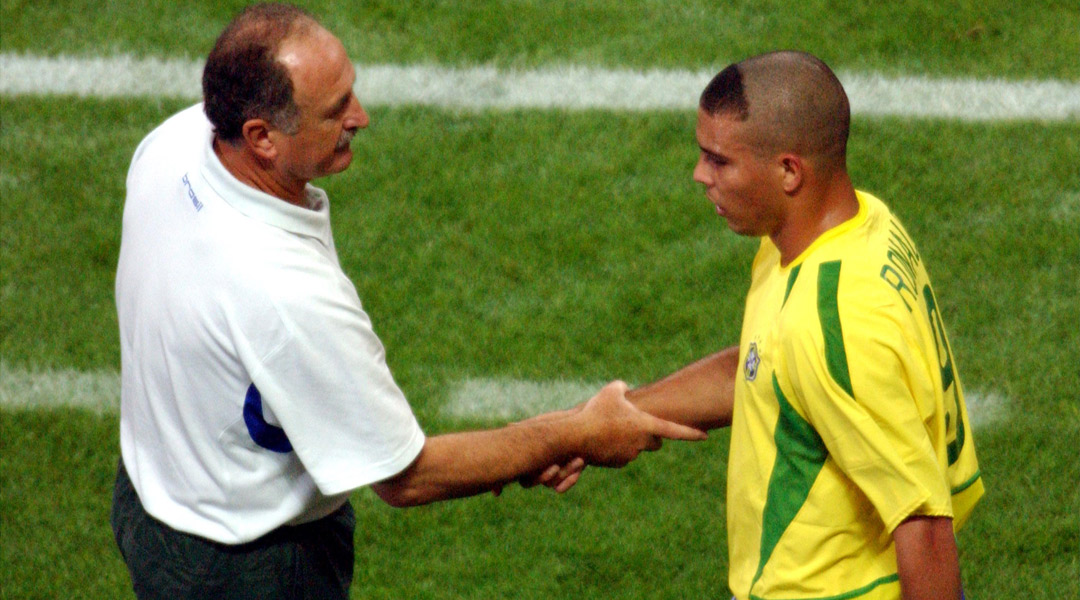
Enzo Bearzot
(Italy’s 1982 World Cup-winning gaffer.)
Have a siege mentality
“My players hated the journalists for what they did [the press had been critical of the squad throughout the tournament]. They really hated them. After the game against Brazil, an Italian journalist tried to come into the changing rooms to congratulate us. Some of the players actually went for him, they were so furious. There was a little bit of bitterness – and an immense feeling of joy, of achievement.”
Be patriotic
“Turning out for the national team is the ultimate achievement for a player, the ultimate recognition of his talents. You have to make sure your players understand that, you have to ensure that they draw confidence from it. Is that sort of pride in the national team dying out? I do hope not.”
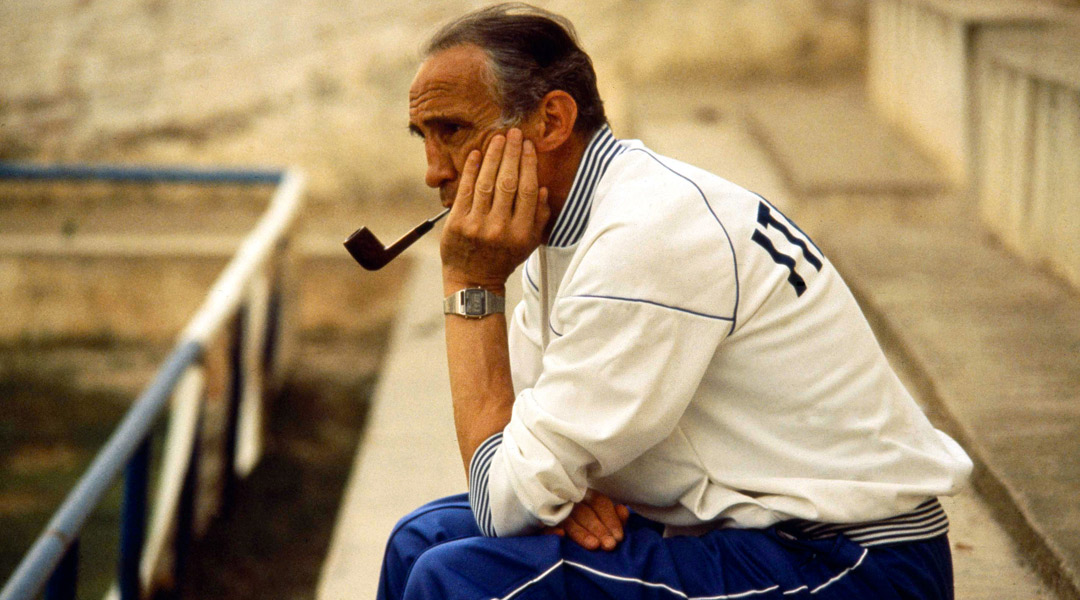
Carlos Bilardo
(Managed Argentina to the 1986 title.)
Stick to your guns
“We got criticism for our playing style, for the players I picked, some even criticised me for picking Maradona as captain. We were not placed in the list of potential winners. But we took advantage of that – we knew it was going to be excellent proving everybody wrong.
“The cornerstone of the process was in 1984, when we deployed a new 3-5-2 system. It was difficult to set up but I was convinced it was the best for us. But everyone, from fans to journalists to players, asked me: ‘Who’s the right winger? Who’s left-back?’ It was difficult to explain. Fixed positions were no longer useful. I said: “I prefer to be understood by 30 players than 30 million Argentines.’ The press wanted me out. The front of my house was attacked. I had to tell my wife to put a “sold” sign up before key games. Nobody had confidence in us. The day we left, the airport was almost empty. But when we arrived, 500,000 people were celebrating.”
Improvise
“Argentina had most of their players in Europe. To practice, Burruchaga had to take free-kicks in Nantes and Ruggeri headed them home in Madrid. I talked to the players as much as possible and explained moves over the phone. At the Ezeiza training ground, I had a mobile phone in a big suitcase. Nobody else in Argentina had one! I used it to call players that were abroad. Everyone would look at me in desbelief.
“If I travelled to Europe, I’d ask for permission to train with a player in the afternoon. It was funny. I’d say: “Burruchaga, now imagine that the orange cone is Batista.” We had dinners to talk about tactics, always with a board and arrows to explain movements, and we watched lots of videos.”
Win your first game
“The first game is fundamental. We’d watched 10 matches of the Koreans on video, we knew how hard they played. It’s critical to start on the right foot, because the pressure of the second game if you have lost the first one is terrible. We found that out in 1990.”
Never be satisfied
“After beating Germany, I was very angry and couldn’t celebrate. They scored two goals from set-pieces, even though we’d practiced those plays. That’s how I felt football. That’s why I wanted to keep managing Argentina for a second World Cup. I felt that the 3-5-2 had not yet seen its full potential.”
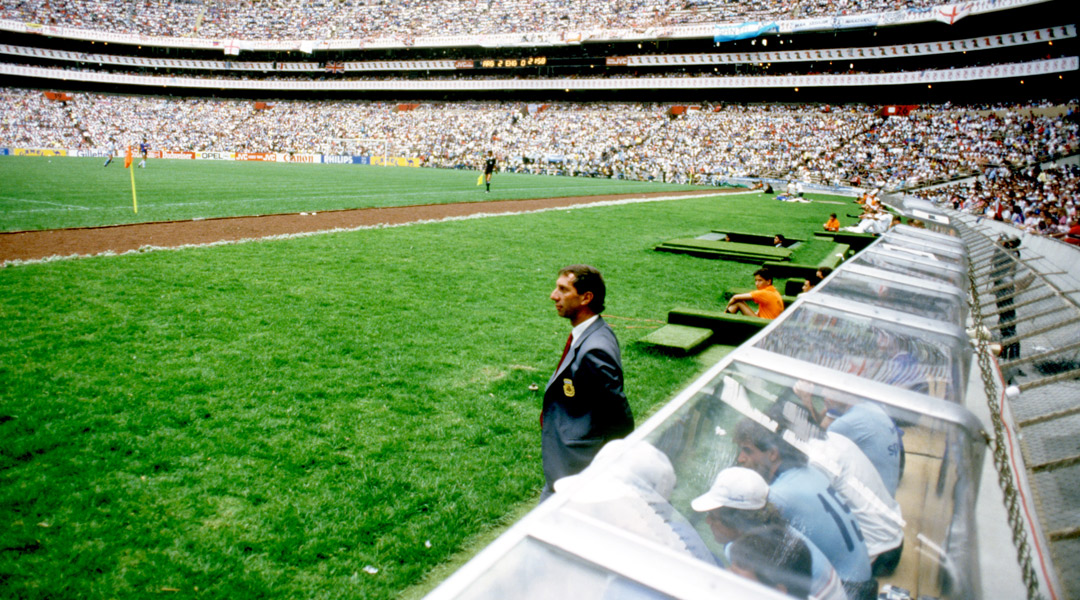
Jose Luis Brown
(Won with Argentina as a player in 1986, scoring in the final.)
Remember previous games don’t count
“We’d a suffered a lot in the qualifying round in order to get to the 1986 World Cup. We almost went out at home against Peru. An injury-time goal saved us. The press destroyed us. They even criticised Maradona. There was a campaign to have our manager sacked. But we were united as a group, and from that union, we knew we had the strength to overcome everything.”
The month before the cup is crucial
“The players finally meet, club competitions are over, and the mind is clearly pointing towards the World Cup. You train and live every day as team-mates. You start realising how you feel and you can quickly realise how far your team can go.”
Be aware of your limitations
“But never feel inferior! I knew it would have been very hard for me to play if Daniel Passarella had been fit, but I trained with all my spirit because I knew I had to be ready. Passarella suffered hepatitis and I played all the games. Long before that, Bilardo made me watch videos of Stielike, who was an amazing sweeper. I lacked his panoramic vision and his technique, but I knew he lacked my will and passion.”
Believe that anything is possible
“A year before the World Cup, I got an injury with the national team and Espanyol didn’t want me. I spent the last months alone in Buenos Aires, training on the road. Was it hard? Definitely. Did I quit? Never. My desire to go to the World Cup kept me going. Once I was there, I wasn’t going to let myself be substituted. I suffered a dislocated shoulder in the final. I was in pain, so I played with my hand inside my shirt. Every time I approached the touchline, I’d see Bilardo with my number on the board, waiting for me to ask for substitution. Impossible. The only way I would have left the pitch is if I was dead.”
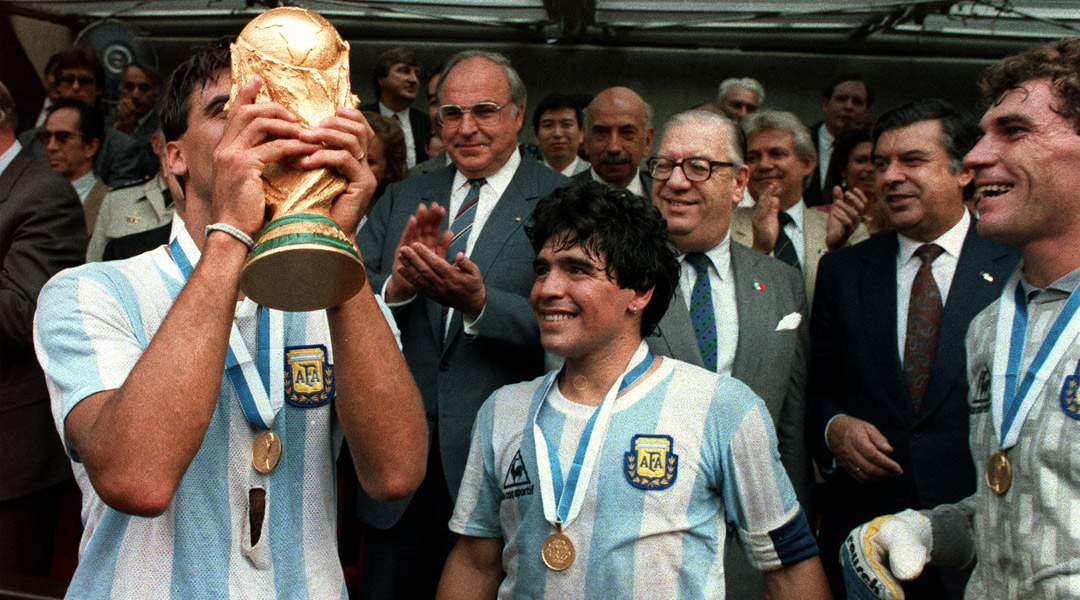
Aime Jacquet
(Led France to glory on home soil in ’98.)
Have a ‘Plan B’
“The key to winning a World Cup is to put in place a system that could change at any time. In my head, I had already considered the possibility of being able to play without Zinedine Zidane, without Laurent Blanc, without Marcel Desailly – to be able to tackle all the games. It's lucky I did that, because we had many misfortunes in the competition. You have a group of 22 players, not 11. That was our strength when we won the World Cup in 1998.”
Have a rapport with the players
“The main thing is not that the players like their coach – the main thing is that a manager must like his players, he must value them. He must be extremely professional with them, but also have a very human rapport, as he must take part in their development, in their thoughts. The first quality of a manager is to know how to listen to his players, but it also requires having a message, a precise message that is very well understood by everyone. That's why the individual rapport is important, but it must be registered within the group.”
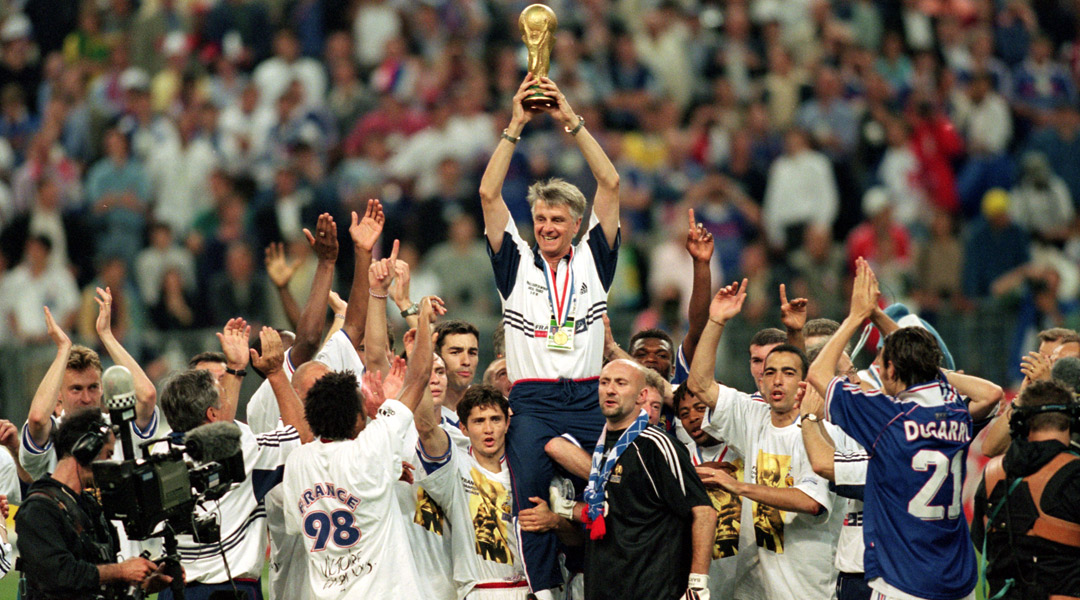
Joe was the Deputy Editor at FourFourTwo until 2022, having risen through the FFT academy and been on the brand since 2013 in various capacities.
By weekend and frustrating midweek night he is a Leicester City fan, and in 2020 co-wrote the autobiography of former Foxes winger Matt Piper – subsequently listed for both the Telegraph and William Hill Sports Book of the Year awards.
